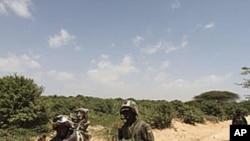A spokesman for the African Union Peacekeeping Mission in Somalia, known as AMISOM, has welcomed the news that the U.N.Security Council will vote this week to increase the size of AMISOM forces from 12,000 to nearly 18,000.
AMISOM is battling the Somali militant group Al-Shabab, which warned over the weekend that it will step up its bombing campaign in the Somali capital, Mogadishu.
Lt. Col. Paddy Ankunda, spokesman for AMISOM, said the peacekeepers need the additional troops and what he calls “force enablers,” such as helicopters, maritime assets and engineers.
“We requested for an increment to at least 17,000 to deploy another 6,000 in other sectors of the country. We need more force enablers; we need helicopters; we need maritime assets; we need engineers. All these will be very, very crucial to help us launch phase two of the operation,” he said.
Ankunda said AMISOM welcomed the contribution of Kenyan troops in the fight against Al-Shabab and was anxiously awaiting the passage of the U.N. Security Council resolution.
“First of all, we welcome the Kenyan troops that were in the south. What we need now is the United Nations Security Council resolution so that they can transfer to the A.U. Mission. Now, the fact that they will be deploying in the south, that means that they help us launch more easily into Phase II, because Phase II we were supposed to take over part of south Somalia, including key Al-Shabab cities like Kismayo,” Ankunda said.
Al-Shabab warned over the weekend that it would step up its bombing campaign in the Somali capital, Mogadishu.
Ankunda said it would take some time for AMISOM to bring security to all of Somalia.
“It is not easy to ensure a 100 percent security for a country that has been at war for all these years. Honestly speaking, once or twice these guys will go through the net and you will get a bomb going off in the wrong place. This is a country that is trying to recover from conflict. Al-Shabab by now has spread in the population. So it’s going to take a bit of time to completely wipe out this threat of improvised explosive devices,” Ankunda said.
He said he expects AMISOM to stay in Somalia even if the Somali Transitional Federal Government term expires some this year.
“I think, even if the transition ends, the A.U. mission will have to continue because there are still a lot of things that we have to do, including the transitional federal institutions, particularly the Somali army and the national police force,” Ankunda said.




